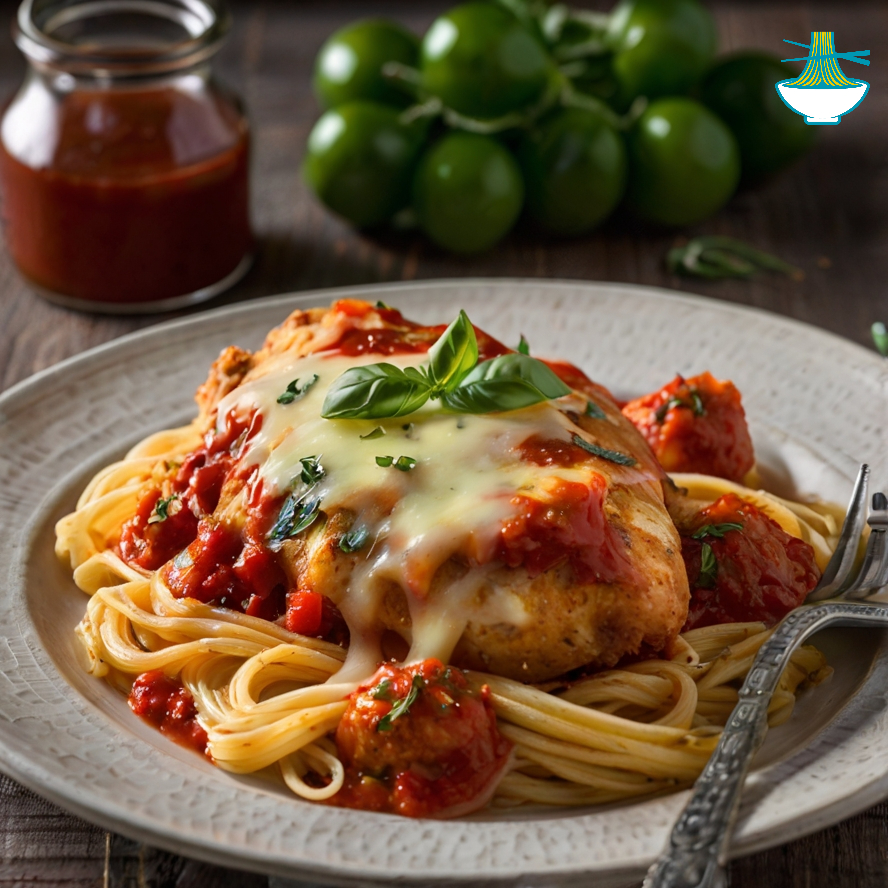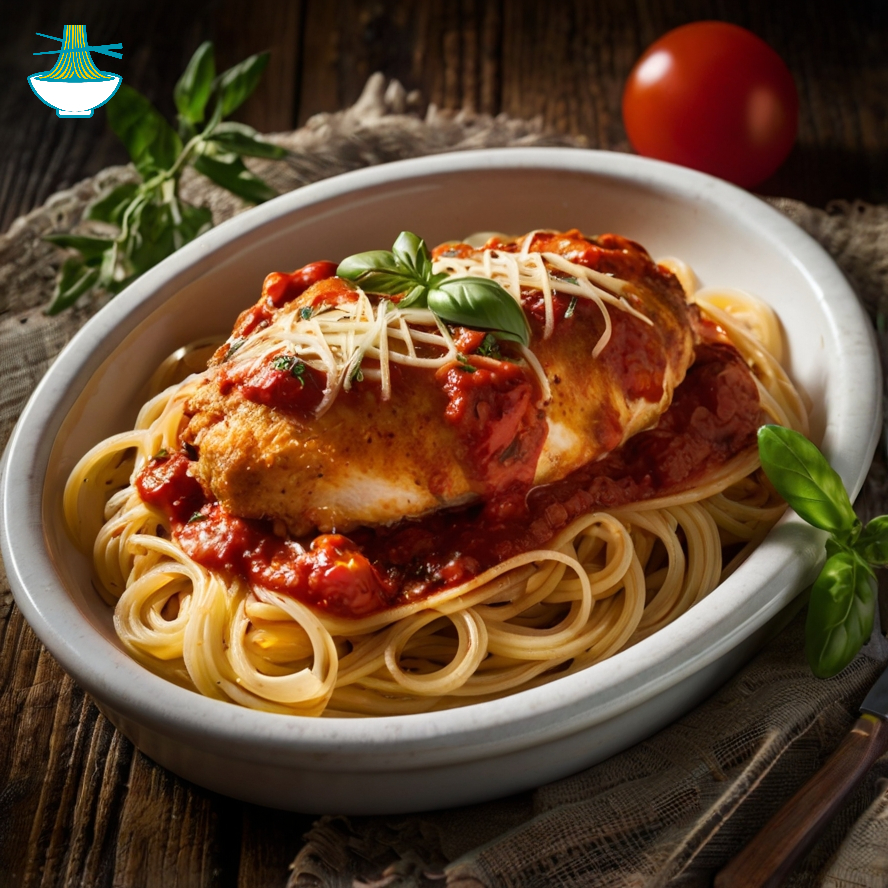Chicken Parmesan, also known as Chicken Parmigiana, is a delicious Italian chicken dish that consists of breaded chicken breasts topped with rich marinara sauce and melted mozzarella cheese and parmesan cheese. Originating from Italian-American cuisine, this dish has gained global popularity, especially in the U.S. and Australia. It is often served with pasta, making it a hearty meal for family gatherings and social occasions.
This dish provides essential nutrients, including high-quality protein from the chicken, which supports muscle growth and repair. The mozzarella and parmesan cheeses are rich in calcium, promoting strong bones and teeth, while the marinara sauce provides a good source of vitamins A and C from tomatoes. However, due to its high calorie and fat content, particularly from cheese and frying, it's important to enjoy Chicken Parmigiana in moderation. Balancing it with vegetables or a lighter side can enhance its nutritional benefits while reducing potential health risks.
Ingredients:
- 4 boneless, skinless chicken breasts
- 1 cup seasoned breadcrumbs
- 1 cup all-purpose flour
- 2 eggs, beaten
- 2 cups marinara sauce
- 2 cups shredded mozzarella cheese
- 1/2 cup grated parmesan cheese
- Salt and pepper to taste
- Olive oil
Method:
Preheat the Oven: Set your oven to 375°F (190°C).
Prepare the Chicken:
- Season the chicken breasts with salt and pepper.
- Dredge each breast in flour, ensuring an even coat.
- Dip into the beaten eggs, allowing any excess to drip off.
- Coat thoroughly with seasoned breadcrumbs, pressing gently to adhere.
Fry the Chicken:
- In a large skillet, heat a thin layer of olive oil over medium-high heat.
- Fry the breaded chicken breasts for 3-4 minutes on each side, or until golden brown.
- Transfer the fried chicken to a baking sheet lined with parchment paper.
Assemble the Dish:
- Spoon marinara sauce over each chicken breast.
- Sprinkle with shredded mozzarella and grated Parmesan cheeses.
Bake:
- Place the baking sheet in the preheated oven.
- Bake for 20-25 minutes, or until the cheese is melted and bubbly, and the chicken is cooked through.
Serve:
- Serve the Chicken Parmesan hot, accompanied by a side of spaghetti or your preferred pasta.
Note:
- Feel free to use store-bought marinara sauce or make your own by sautéing garlic and onions in olive oil, adding crushed tomatoes, and seasoning with salt, pepper, and Italian herbs.
Frequently Asked Questions :
Can the recipe be modified to suit specific diets (e.g., low-carb or vegetarian)?
Yes, the recipe can be easily adjusted for different dietary preferences:
- Low-carb: Replace the breadcrumbs with crushed almonds or coconut flour for a low-carb option.
- Vegetarian: Use eggplant or zucchini in place of chicken for a satisfying vegetarian alternative.
- Gluten-free: Opt for gluten-free breadcrumbs and flour.
- Vegan: Use plant-based cheese and tofu or tempeh to create a delicious vegan version.
What are the best side dishes to serve with Chicken Parmigiana?
- Vegetables: A side of steamed or roasted vegetables, such as broccoli, zucchini, or green beans, complements the dish while adding fiber and essential nutrients.
- Salad: A fresh green salad with a light vinaigrette provides a refreshing contrast to the richness of Chicken Parmigiana.
- Pasta: For a traditional pairing, serve with spaghetti or another type of pasta. To keep it healthier, consider whole wheat pasta or zucchini noodles.
How should leftover Chicken Parmigiana be stored?
- Store leftover Chicken Parmigiana in an airtight container in the refrigerator for up to 3-4 days.
- To reheat, place it in the oven at 350°F (175°C) for 10-15 minutes or until heated through. You can also reheat it in the microwave, though the crispy breading may not retain its texture.
Can this dish be made faster or in a healthier way?
- Faster Method: Instead of frying, you can bake the chicken directly in the oven after breading it. This reduces preparation time and eliminates the need for frying.
- Healthier Method: To make it healthier, reduce the amount of cheese and use a lower-fat version. You can also grill the chicken instead of frying it to reduce the overall fat content.
What are the nutritional benefits of Chicken Parmigiana?
- Chicken Parmigiana provides high-quality protein from the chicken, which supports muscle growth and repair. The mozzarella and parmesan cheese offer calcium for bone health, and the marinara sauce provides antioxidants, particularly vitamins A and C, which are beneficial for immune function and skin health.
Are there any health risks associated with eating Chicken Parmigiana frequently?
- While Chicken Parmigiana is nutritious, consuming it too often may contribute to excessive calorie, fat, and sodium intake. The dish is high in saturated fats, especially from the cheese, and frying the chicken adds additional unhealthy fats. It's best enjoyed in moderation, particularly if you're watching your calorie or fat intake.

Nutrition Value:
4 boneless, skinless chicken breasts
- Calories: Approximately 110-130 (per 4 oz or 113g serving)
- Protein: 26-30g
- Fat: 3-5g
- Carbohydrates: 0g
Benefits:
- High in protein, essential for muscle repair and growth.
- Low in fat, making it a lean source of protein for a balanced diet.
- Rich in B vitamins (particularly niacin and B6) that support metabolism and energy production.
1 cup seasoned breadcrumbs
- Calories: Approximately 120
- Protein: 4g
- Fat: 1g
- Carbohydrates: 24g
Benefits:
- Provides carbohydrates for energy.
- Adds texture to the chicken, giving it a crispy coating.
- Often fortified with iron and other minerals, depending on the brand.
1 cup all-purpose flour
- Calories: 455
- Protein: 13g
- Fat: 1g
- Carbohydrates: 95g
Benefits:
- Source of carbohydrates for energy.
- Contains small amounts of protein and fiber, especially if whole wheat flour is used.
- Provides essential minerals like iron, important for blood health.
2 eggs, beaten
- Calories: 140 (for 2 large eggs)
- Protein: 12g
- Fat: 10g
- Carbohydrates: 1g
Benefits:
- High in protein, which supports muscle health.
- Rich in vitamins A, D, E, and B12, promoting immune function and skin health.
- Contains healthy fats that support brain and hormone function.
2 cups marinara sauce
- Calories: 180 (for a standard serving of marinara sauce)
- Protein: 4g
- Fat: 6g
- Carbohydrates: 28g
Benefits:
- Contains antioxidants like lycopene, which may reduce the risk of certain cancers.
- Provides vitamin C and potassium for immune function and heart health.
- Rich in fiber, supporting digestion.
2 cups shredded mozzarella cheese
- Calories: 560
- Protein: 40g
- Fat: 40g
- Carbohydrates: 4g
Benefits:
- High in protein and calcium, which are essential for bone health.
- Rich in fat, which provides energy and supports cell function.
- Good source of vitamins A and D.
1/2 cup grated parmesan cheese
- Calories: 220
- Protein: 20g
- Fat: 15g
- Carbohydrates: 4g
Benefits:
- High in protein, which supports muscle growth.
- Rich in calcium and phosphorus, vital for bone health.
- Provides healthy fats for energy.
Salt and pepper to taste
- Calories: Negligible
- Protein: Negligible
- Fat: Negligible
- Carbohydrates: Negligible
Benefits:
- Salt helps with electrolyte balance, muscle function, and hydration.
- Pepper contains piperine, which may enhance nutrient absorption and has antioxidant properties.
Olive oil
- Calories: 120 (per tablespoon)
- Protein: 0g
- Fat: 14g (mostly monounsaturated fats)
- Carbohydrates: 0g
Benefits:
- Contains healthy monounsaturated fats, which are beneficial for heart health.
- Rich in antioxidants, such as vitamin E, which protect cells from damage.
- Has anti-inflammatory properties and may support overall wellness.
Nutritional Value per Serving:
- Calories: 600 kcal
- Protein: 28 grams
- Carbohydrates: 40 grams
- Fat: 32 grams
- Sodium: 900 milligrams
- Cholesterol: 85 milligrams
- Vitamins: Rich in Vitamin B6 and niacin, supporting energy metabolism.
- Minerals: A good source of calcium, phosphorus, and selenium.
These values can vary depending on the exact portion sizes and specific ingredients used, especially the amount of cheese and sauce.


Comments